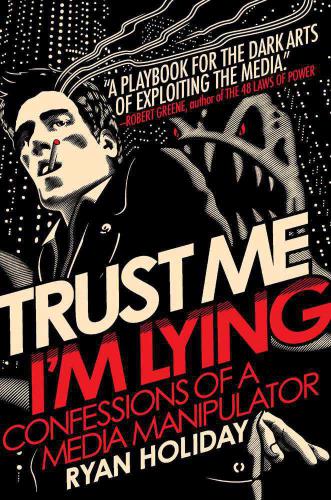
Trust Me, I'm Lying
Confessions of a Media Manipulator
کتاب های مرتبط
- اطلاعات
- نقد و بررسی
- دیدگاه کاربران
نقد و بررسی

July 16, 2012
In this revealing volume, Holiday describes the marketing strategies he's learned, developed, and put into practice through his work with such infamous entities as American Apparel (under whose auspices he serves as director of marketing) and the notoriously irreverent Internet-to-print phenom Tucker Max. A self-described "media manipulator," Holiday candidly states that his "job is to lie to the media so they can lie to you." According to him, it's all part of the game. Though he admits to being "no media scholar," Holiday effectively maps the new media landscape, from "small blogs and hyperlocal websites," to "a mix of online and offline sources" and the national press. But his main market is blogs, and given the increasingly interconnected nature of the Digital Age and the rise of blogs as veritable news outlets, his focus is prescient and his schemes compelling. From fabricating stories and marketing them "until the unreal becomes real," to defacing his own billboards to build street-level buzz, Holiday's tactics may not represent the apogee of ethical marketing, but they workâfolks love to hate American Apparel's lewd ads, and the vitriolic concoction that Holiday brewed around Tucker Max took his book, I Hope They Serve Beer in Hell, to #1 on the New York Times bestseller list. Media students and bloggers would do well to heed Holiday's informative, timely, and provocative advice.

June 15, 2012
In his first book, media consultant and American Apparel marketing director Holiday takes on the blogosphere, finding its content to be little more than manufactured and manipulated "conflict, controversy, and crap." "Did Saddam Hussein write book reviews for Kirkus?" Of course he did not, but such a headline, writes the author, would be typical for a "blog," by which he means all online publishing including Twitter, major and obscure websites, Web videos, group blogs with hundreds of writers and whatever else is out there. All blogs face the same pressures and same weaknesses. In a medium of infinite space and endless deadlines, they must publish and publish often--a professional blogger must write several times per day in order to make any money at all. All of this is driven by the need for page views, the number of times someone hits on a website. Page views determine advertiser dollars, which determine the reality presented by blogs. In the search for "traffic by any means," journalistic standards and responsibility often go out the window, replaced by a new strategy: Publish first, and then, perhaps, verify. Headlines must instantly capture the audience's attention, and adding a question mark allows plausible deniability. Truth gives way to sensationalism and innuendo, and blog-fed information devolves into "sensationalism, extremism, sex, scandal, hatred." But if blogs manipulate, they can also be manipulated. Plant a story--true or not--in a small blog, and it could be picked up by a larger blog, then by a large media outlet. Holiday has done this countless times to create a buzz about authors, musicians, clothing apparel, etc. Ultimately, this practice is harmful. Reputations can be destroyed in a few minutes, but more broadly, blogs create a "constructed reality," a world that does not really exist but yet seems true. Holiday has written more than a dyspeptic diatribe, as his precise prose and reference to the scholarship of others add weight to his claims. A sharp and disturbing look into the world of online reality.
COPYRIGHT(2012) Kirkus Reviews, ALL RIGHTS RESERVED.

























دیدگاه کاربران